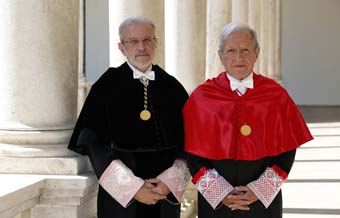
Pascual Sala, former president of the Constitutional and Supreme Court, has claimed the full implementation of the basic principles of the welfare state, also in a context of a serious economic crisis. The University of Valencia has conferred Sala this Monday as Doctor ‘Honoris Causa’. During the event, held at La Nau, special awards of doctorate 2012-2013 were also given.
The event was attended by political, social and university representatives, as well as by presidents of the highest Spanish courts: Constitutional (Francisco Pérez dels Cobos), Supreme (Carlos Lemes) and Accounts (Ramón María Álvarez de Miranda).
The speech of Pascual Sala was entitled: ‘The constitutional guarantee of economic and social rights and their effectiveness in times of economic crisis’. The jurist, who studied at the University of Valencia, has made a strong defence of the social and economic rights enshrined in the Spanish Constitution, and has analysed the possibility of reversibility of these in situations of budget cuts due to the crisis.
Sala has stated: “Attributing to the economic crisis the decline of the welfare state or focusing on this, almost exclusively, the adjustments that the same crisis requires, is equivalent to sustain, in a way of hypocrisy regulations, that the configuration and the content of the social and economic rights –in our Constitution and in the European Community law- are a simple desire that will only be feasible when the economic circumstances allow it. However, to reason in this way, it is needed to transfer this dependence to the correspondent legal texts, which, in any of the states that make up the European Union –neither our state- nobody has dared to make. On the contrary, in all policy statements it is usually highlighted the implementation and the necessity to maintain the welfare state that has required so much effort to become a reality, mainly in the levels within the European Community framework.
He added: “It is not sinning of over-optimism to think that the economic crisis can be overcome without any effect on the levels of the content in this legal-constitutional formula that is fortunately current in our societies. But it is a duty of the highest order to get to the restrictions in this context after having exhausted the possibilities of doing so in others not specifically protected by “direct” commandments of the Constitution and after having put in actual practice, not purely theoretical, the results of the possible alternatives that offer, as I have attempted to summarise: the equitable assignment of public resources, the effective completion of the right to have a good government and a good administration and the fight against the embezzlement and its usual consequence, which is none other than the corruption”.
The full speech of Pascual Sala can be found in this link: http://links.uv.es/Zq0PPNn
For his part, Principal Esteban Morcilo has remarked a twofold of Pascual Sala, the professional part “embodied in his work as a judge and magistrate from the beginning of his career, and the academic part, as a teacher and for his outstanding contributions to the legal doctrine recognised by the received awards and honours”. Esteban Morcillo highlighted an element which is “especially important” element: the emotional and affective attachment of Pascual Sala “with his ‘alma mater’, the University of Valencia, and his beloved Faculty of Law”.
The Principal has framed the recognition to Sala in a very specific line: “‘Honoris Causa’ Doctors recently invested by this University have reported in their respective lectures, delivered in the same auditorium of the Paranimf, the risks of certain policies of fiscal consolidation and austerity, as did professor Muñoz Machado with his speech on Poverty and Law, or Mr. Iñaki Gabilondo, a communicator that ‘passionately embraced the human vicissitudes’ ... ‘in real life , where noble causes do not provoke laughing, and economist Paul de Grauwe who defined these policies as a ‘morality play’”.
The intervention of Principal Esteban Morcillo can be fully read at the link: http://links.uv.es/FNQw17I
The ‘laudatio’ on Pascual Sala was given by Full University Professor Juan Martín Queralt, who has placed it in “that generation who rewrote our Public Law in political circumstances particularly unfavourable”. Martin emphasised the love to the Law of Sala: “The Law is the supreme value of society, an good so unnoticed as health, whose value is known only when we realise we’ve lost it. Queralt has added: “The Law has been his vocation, every day, his life. And he has lived it with the tension of who is playing the most difficult role in life, to judge. In the ‘laudatio’ it has also been stressed the “love to Valencia” of the magistrate, and his links to the University of Valencia.
The full ‘laudatio’ can be read at this link:
Pascual Sala Sánchez (Valencia, 1935) was President of the Constitutional Court between 2011 and 2013, of the Supreme Court and the General Council of the Judiciary (1990-1996) and of the Spanish Court of Audit (1988-1990).
Graduate in Law by the University of Valencia, he taught as an Assistant Professor in the Faculty of Law of the University and as a Professor in the School of Legal State Corps of Argentina.
Pascual Sala entered the judicial career in 1962, being the number one of his promotion. Throughout his long judicial activity he served as a Judge of First Instance and Instruction, as the magistrate of the Administrative Chamber. After obtaining through public competition the rank of magistrate specialised in this jurisdiction, he exercised in different regional audiences, as a Counsellor of the Court of Audit, as Judge of the Supreme Court and as a Permanent Member of the General Commission of Codification.
Author of an extensive doctrine work in the field of Law, its legal activity has been recognised with awards ‘Important’ and ‘García Esteve’ to renowned jurists. Among other awards and decorations he has been awarded the Gran Cruz de San Raimundo de Peñafort and la Medalla de la Orden del Mérito Constitucional.
Last update: 26 de may de 2014 08:00.
News release



















